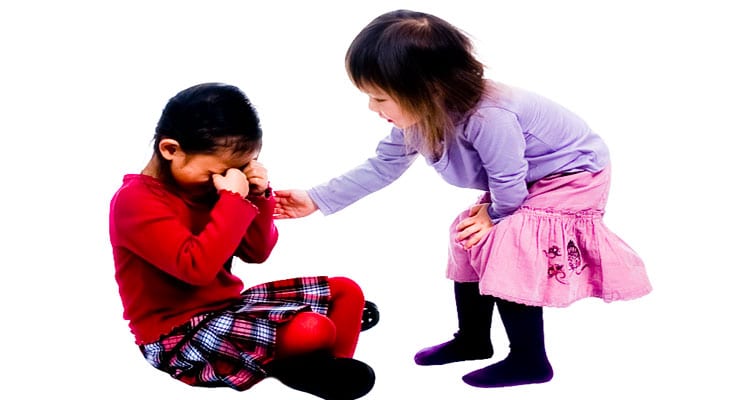As a psychologist, parents frequently ask me how to cultivate empathy in their children. Instead of only understanding their own point of view, parents wish for their children to learn how to share, take others’ perspectives, and overall how to value other people’s opinions just as their value their own.
Here are five ways to teach empathy to your children, whether they are toddlers, preschool aged, or school aged.
- Teach them about emotions.
Kids can’t empathize with what others are feeling if they don’t know how to put words to their own emotions. As your child goes through his day, make sure to point out which emotions you see him feel, and also which ones you’re feeling.
Example: “I see you’re disappointed that there was only one cookie left.” “Mommy felt anxious right there when the car didn’t start.”
No child is too young to start hearing emotion words and learning what they mean.
- Read together.
Even the simplest board book will have characters that your child can learn to empathize with. Don’t just read, but discuss what characters are feeling as the story progresses.
Example: “Elmo looks sad there when he didn’t see his friends at first. Now that they surprised him with a cake, I wonder what he’s thinking!”
- After conflicts, discuss what everyone was feeling.
While your child is hitting his sibling is not the time to discuss feelings. But when the children are separated and have calmed down, it is a great time to go back and talk about what each child was feeling. Younger children can be guided to figure out what they may have been thinking or feeling at the time. This can be done while helping them figure out how to express their feelings in a more adaptive way.
Example: “You seemed very frustrated when Josh took your car. I think that is why you hit. Hitting isn’t okay, but maybe next time you could say, It was my turn and I’ll give it to you next.”
- Let them see you resolve conflicts in your own life.
Almost everyone argues in front of their kids sometimes, even though ideally you should limit this. The key to ensuring that any arguments that do occur do not have a bad impact on your kids is by making sure that if you fight in front of the kids, you make up in front of them too. Obviously, if you cannot keep your tone and your words under control, make sure to wait until the children are not near you, but a good rule of thumb to remember is: if kids never see conflict resolution in a relationship, they will be unlikely to be able to resolve conflicts in their own later relationships. Make sure to take the other party’s perspective in order to resolve.
So, if you and your husband are arguing over, for example, division of household tasks, be sure to have the children see when you compromise over who will do the laundry and who will drive the kids to soccer. Then they will see that arguing is okay, it can lead to productive resolutions, and that people can love each other even when they disagree.
Example: “I know you’re tired after work, so would you like me to do the driving while you put in the laundry, then we can both fold together later?”
- Speak for people/creatures who can’t speak.
Children frequently exhibit empathy toward babies, who naturally elicit empathy as an evolutionary adaptation to ensure that they get taken care of by older humans. To make the most of this phenomenon, make sure to discuss and wonder aloud with your child about what babies (and pets) may be feeling.
Example: “Baby Mike looks upset. What do you think is wrong? Do you think he is hungry or tired?” or “Laila is sniffing Grandma a lot. Is she trying to make friends?”
These are some little tips to ensure that you can help your child reach her innate potential to be empathic and kind. However, there is no substitute for acting empathic yourself, and allowing your child to observe you. Your child will learn the most from watching you interact with others in a kind, empathic way.
Visit Dr. Samantha Rodman on Dr. Psych Mom, on Facebook, or on Twitter.





